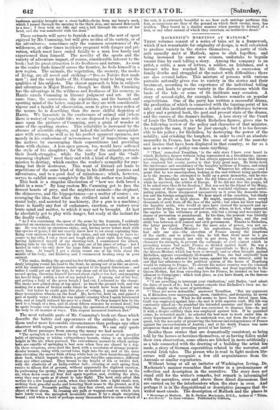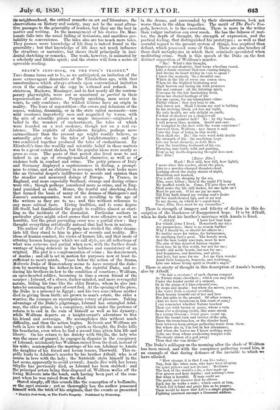MACKENZIE'S MORNINGS AT MATLOCK. * TRINE volumes consist of a series
of tales set in a framework, which if not remarkable for eriginalty of design, is well calculated to produce variety in the stories themselves. A party of visit, ants case ally meet at Matlock, agree to club together, and being increased by some new comers, undertake to beguile vacant time by each telling a story. Among the company is an artist, a critic, a man of letters, a soldier, an Irishman, and a baronet who has reached his title through a succession of family deaths and struggled at the outset with difficulties ; there are also several ladies. This mixture of persons with various pursuits naturally gives rise to variety in the stories and their treatment, according to the experience of. the individual telling them; and leads to greater variety in the discussions which the basis of the tale or some of its incidents may occasion. A story of second-sight, for example, induces remarks on popular superstitions. One of the party has written a successful drama, the production of which is connected with the turning-point of his tale ; and this incident occasions a debate on the difference between a play and a printed book, the past and present state of the drama, and the causes of the drama's decline. A love story of the Court of Louis the Thirteenth, in which Richelieu figures, gives rise to the following review of the policy and character of that minister. As regards the man, it may be just enough ; but it is too favour- able to his policy ; for Richelieu, by destroying the power of the nobility, and crushing the burghers, in order to erect an absolute monarchy in France, has been the cause of most of the anarchy and licence that have been displayed in that country, so far as a man or a course of policy can cause anything.
"'That,' remarked Tressilian, is the only story I have ever heard in which Richelieu figurimi without being represented as a bloodthirsty, uncon- scionable, tigerlike character. It has always appeared to to me that history has rendered. but scanty justice to that truly great man, He broke down the intolerance and ascendancy of the haughty noblesse of France, and raised an independent monarchy upon their ruins. 'Whatever his offences,—and I grant that he was unscrupulous, looking at the end without being particular as to the means,—he attempted to build up a great monarchy, and he suc- ceeded. He breathed new life into the dry bones of a realm, and made it, while he survived, the arbiter of Europe. If he did not free the people, let it be asked were they fit for freedom ? But was not he the friend of the Many, the enemy of their oppressors ? Before his watchful vigilance and antici- pating genius, there disappeared successively as it arose the domestic trea- son and the foreign antagonism. We hear much of his cruelties, but chiefly because he struck at high places. He might, unquestioned, have swept thousands of serfs from of the face of the earth; but when his blow reached the haughty noble, who would at once have coerced the monarch and op- pressed the people he was accused of cruelty, when, in fact, what appeared the caprice or the wilfulness of power, was but a strong and necessary in- stance of prevention or punishment. In his time the peasant was literally nobody : the noble oppressed, and, the state 'tared him and the real strife was between Civil contest and civil government. Thanks to Richelieu, the latter prevailed. Power, for the mere sake of power, was not co- veted by the Cardinal-Minister: his aspirations, singularly unselfish, had only one aim—the elevation of France among the kingdoms of the earth; and to achieve this, he felt that there must be a go-. vernment strong enough not only to put down, but by its undoubted character for strength, to prevent the outbreaks of civil contest which in preceding reigns had made France so divided against itself. He was a worthy successor of Sully. The charge of' ingratitude to Mary de Mecliei, the Queen-Mother, which has been so strongly and so often brought against Richelieu, appears exceedingly ill-founded. True. she had originally been his patron ; but he adhered to her cause, against his own interest, until he saw that her adherence to the political system of the house of Hapsburg would be ruinous to France. To elevate his native country. was the constant and consistent object of his life • and therefore, not from ingratitude to the Queen-Mother, but from exceeding love for France, he insisted on her ban- ishment to Colpeigne ; which took place, as you have heard, on the famous Day of the Dupes.' "'I am unwilling to interrupt your vindication,' said Butler, 'and admit the force of much of it ; but I cannot concede that Richelieu's vices are de- fensible simply on the score of patriotism.'
"'Vices are never defensible,' answered Tressilian. But my argument is, if Richelieu were unscrupulous, stern, vindictive, and designing, he never was unnecessarily so. What he did seems to have been forced upon him. Craft was employed against him—he met it with superior craft. His life was constantly aimed at—he punished the intended assassins and those who set them on. Ingenuity of every kind was exercised to disgrace him—he met it with a deeper subtlety than was employed against him. If he punished crime, he rewarded merit ; he selected the best men to work under him in every department of the state ; he undertook war, not from the lust of can- quest, but the necessity of preserving the honour and independence of France against the encroachments of Austria ; and at his death France was more prosperous than at any preceding period of her history.' "
Besides those stories that are dramatically consistent, as being told by the heroes or heroines themselves, or as having fallen under their own observation, some others are hitched in more artificially ; as a tale connected with the drawing of a building the artist has made, a story of German superstition related to the narrator, and several Irish tales. The person who is read in light modern lite- rature will also recognize a few old acquaintances from the Annuals or similar repositories.
Without being at all an imitator of Washington Irving, Dr. Mackenzie's manner resembles that writer in a predominance of reflection and description in the narrative. The story does not stand still for the writer's remarks, but remark is intermingled with the narrative, over and above those direct discussions that are carried on by the interlocutors when the story is over. And perhaps it is in the disquisitional or descriptive passages that the writer most excels. The description of Matlock and the places in
1, Mornings at Matlock. By It. Shelton Mackenzie, D.C.L., Author of " TithFA. svi Art-Novel." In three volumes. Publishedby Colburn,, itis neighbourhood, the critical remarks-on. art and literature, the observations on history and society, may not be the most attrac- tive passages. to the generality of readers, but they are the best in matter and writing. In the management of his stories Dr. Mac- kenzie falls into the usual failing of fictionists, and sacrifices pro- bability to convenience. The tales also are too much mere tales. They possess more knowledge of life than is indeed found in the generality • but that knowledge of life does not much influence the structure or narrative, but shows itself principally in inci- flental, sketching or remarks. The work, however, is animated by scholarly and lifelike spirit; and the stories will form a series of agreeable reading.



























 Previous page
Previous page